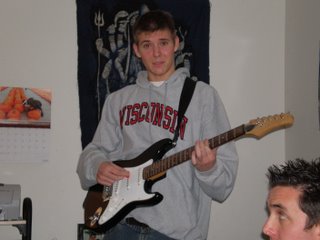HTML 1
The class was about how to write basic code that can be seen in an internet browser. The code we wrote was inside of the notepad program that is commonly found on most computers in the accessories folder. The first idea the instructor said was important was nesting of code. This allows the user to write code in a simple format that is easy to read and go back to to make changes and add on.
The start of every page should include a DOCTYPE! in brackets at the top to let the browser know it is a document. From there it's helpful to let the browser know it is html also in the same bracket as the DOCTYPE!. An important part of creating pages is tags, which is pretty much everything that we did in the class. Important tags are the header tag and the body tag. Inside the body is where most of the other tags are put. Each tag starts out with a
After this we learned to stylize the code. This is inputting code that will change the text, color, justification, etc. We also learned how to add lists, and add pictures in the code. We then talked about hyperlinking, and also how to hyperlink a picture.
This was all very useful, because before this class I had no idea what any of the tags meant in the code that I would look at in the websites we were making. Now it is nice to look at the code and understand what you need to do to simply add something to the webpage. There are a few things you need to know about adding tags, and after knowing them, you can easily modify webpages. I feel this will be helpful in the final project when the time comes to add a line of text or add a picture, because it seems like it will be much easier to just go to the code and add it in where I would like it to show up on my webpage.
 I wasn't sure what that meant with the prices, because someone said they were free, then it was one dollar, then it was one dollar and a two drink minimum ticket. It ended up being the last one, and was overall about 10 bucks only to go to the show. The only live comic I have ever seen was
I wasn't sure what that meant with the prices, because someone said they were free, then it was one dollar, then it was one dollar and a two drink minimum ticket. It ended up being the last one, and was overall about 10 bucks only to go to the show. The only live comic I have ever seen was  said the comedian kept looking at him to see if he was laughing, and made him feel pretty uncomfortable. He was only out there for like 10 minutes though, so that wasn't too bad. The second guy out was much better. He was a big guy from the west named
said the comedian kept looking at him to see if he was laughing, and made him feel pretty uncomfortable. He was only out there for like 10 minutes though, so that wasn't too bad. The second guy out was much better. He was a big guy from the west named  Basically I needed 3 more credits in one category, and none of the classes required were offered next semester or in the summer. This was just terrible because the day had been going so well, Guitar Hero 2 came out, the new Foo Fighters live CD came out, which I didn't buy, but still it did come out so that's exciting, and then all that happiness I felt quickly went away because I overlooked some things on my DARS last semester.
Basically I needed 3 more credits in one category, and none of the classes required were offered next semester or in the summer. This was just terrible because the day had been going so well, Guitar Hero 2 came out, the new Foo Fighters live CD came out, which I didn't buy, but still it did come out so that's exciting, and then all that happiness I felt quickly went away because I overlooked some things on my DARS last semester.  I was a little edgy Wednesday and Thursday morning, but then after talking to some guy today I found out that there can be an exception made and I can take a different class instead and still graduate, and I also found out I can double up on majors now. So no matter what happens, don't worry, everything always works itself out in the end.
I was a little edgy Wednesday and Thursday morning, but then after talking to some guy today I found out that there can be an exception made and I can take a different class instead and still graduate, and I also found out I can double up on majors now. So no matter what happens, don't worry, everything always works itself out in the end.
